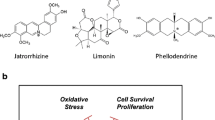Abstract
The present study investigated the antitumor activity and chemopreventive effects of a nanoparticle formulation of curcumin in preclinical models of mouse Pten-deficient prostate cancer. The antitumor activity of the nanoparticle curcumin was evaluated in mouse castration-naïve (7113-D3) and castration-resistant prostate cancer (2945-E10) derived cell lines in vitro. Cell viability was reduced in both cell lines in a dose and time-dependent manner. The effects of long-term dietary supplementation with the nanoparticle curcumin formulation were evaluated in a conditional Pten-deficient mouse model. Prostate tissues from Pten-deficient prostate cancers were obtained after sixteen weeks of dietary supplementation of 76 mg/kg/day or 380 mg/kg/day nanoparticle curcumin. Daily supplementation of nanoparticle curcumin did not affect mouse bodyweights or spleen size but did result in enlargement of the liver. Dietary supplementation did not influence tumor burden, however, mice fed high-dose curcumin had lower cancer cell proliferation rates at 12 and 16 weeks of age. Together, these results show that daily supplementation of a nanoparticle formulation of curcumin is tolerable and suggest that curcumin could have chemopreventive activity in early-stage prostate cancer.





Similar content being viewed by others
References
CANCER STATISTICS IN JAPAN CfCCaIS, National Cancer Center: Latest cancer statistics in Japan. 2018.
Namiki M, Akaza H, Lee SE, Song JM, Umbas R, Zhou L, Lee BC, Cheng C, Chung MK, Fukagai T, et al. Prostate Cancer Working Group report. Jpn J Clin Oncol. 2010;40(Suppl 1):i70–75.
Frattaroli J, Weidner G, Dnistrian AM, Kemp C, Daubenmier JJ, Marlin RO, Crutchfield L, Yglecias L, Carroll PR, Ornish D. Clinical events in prostate cancer lifestyle trial: results from two years of follow-up. Urology. 2008;72:1319–23.
Prasad S, Gupta SC, Tyagi AK, Aggarwal BB. Curcumin, a component of golden spice: from bedside to bench and back. Biotechnol Adv. 2014;32:1053–64.
Ide H, Tokiwa S, Sakamaki K, Nishio K, Isotani S, Muto S, Hama T, Masuda H, Horie S. Combined inhibitory effects of soy isoflavones and curcumin on the production of prostate-specific antigen. Prostate. 2010;70:1127–33.
Ide H, Lu Y, Noguchi T, Muto S, Okada H, Kawato S, Horie S. Modulation of AKR1C2 by curcumin decreases testosterone production in prostate cancer. Cancer Sci. 2018;109:1230–8.
Sasaki H, Sunagawa Y, Takahashi K, Imaizumi A, Fukuda H, Hashimoto T, Wada H, Katanasaka Y, Kakeya H, Fujita M, et al. Innovative preparation of curcumin for improved oral bioavailability. Biol Pharm Bull. 2011;34:660–5.
De Velasco MA, Uemura H. Preclinical remodeling of human prostate cancer through the PTEN/AKT pathway. Adv Urol. 2012;2012:419348.
Koike H, Nozawa M, De Velasco MA, Kura Y, Ando N, Fukushima E, Yamamoto Y, Hatanaka Y, Yoshikawa K, Nishio K, Uemura H. Conditional PTEN-deficient mice as a prostate cancer chemoprevention model. Asian Pac J Cancer Prev. 2015;16:1827–31.
De Velasco MA, Tanaka M, Yamamoto Y, Hatanaka Y, Koike H, Nishio K, Yoshikawa K, Uemura H. Androgen deprivation induces phenotypic plasticity and promotes resistance to molecular targeted therapy in a PTEN-deficient mouse model of prostate cancer. Carcinogenesis. 2014;35:2142–53.
De VelascoKura MAY, Sakai K, Hatanaka Y, Davies BR, Campbell H, Klein S, Kim Y, MacLeod AR, Sugimoto K, et al. Targeting castration-resistant prostate cancer with androgen receptor antisense oligonucleotide therapy. JCI Insight. 2019. https://doi.org/10.1172/jci.insight.122688.
Nasseri E, Mohammadi E, Tamaddoni A, Qujeq D, Zayeri F, Zand H. Benefits of curcumin supplementation on antioxidant status in beta-thalassemia major patients: a double-blind randomized controlled clinical trial. Ann Nutr Metab. 2017;71:136–44.
Sfanos KS, Yegnasubramanian S, Nelson WG, De Marzo AM. The inflammatory microenvironment and microbiome in prostate cancer development. Nat Rev Urol. 2018;15:11–24.
Horie S. Chemoprevention of prostate cancer: soy isoflavones and curcumin. Korean J Urol. 2012;53:665–72.
Ide H, Yu J, Lu Y, China T, Kumamoto T, Koseki T, Muto S, Horie S. Testosterone augments polyphenol-induced DNA damage response in prostate cancer cell line. LNCaP Cancer Sci. 2011;102:468–71.
Tavares AJ, Poon W, Zhang YN, Dai Q, Besla R, Ding D, Ouyang B, Li A, Chen J, Zheng G, et al. Effect of removing Kupffer cells on nanoparticle tumor delivery. Proc Natl Acad Sci USA. 2017;114:E10871–E1088010880.
Narayanan NK, Nargi D, Randolph C, Narayanan BA. Liposome encapsulation of curcumin and resveratrol in combination reduces prostate cancer incidence in PTEN knockout mice. Int J Cancer. 2009;125:1–8.
Devassy JG, Nwachukwu ID, Jones PJ. Curcumin and cancer: barriers to obtaining a health claim. Nutr Rev. 2015;73:155–65.
Jordan BC, Mock CD, Thilagavathi R, Selvam C. Molecular mechanisms of curcumin and its semisynthetic analogues in prostate cancer prevention and treatment. Life Sci. 2016;152:135–44.
Acknowledgements
The authors thank Naomi Ando and Kazuko Hamamoto for their technical assistance and Dr. Nobuyuki Mizoguchi for his excellent veterinary support.
Funding
None declared.
Author information
Authors and Affiliations
Corresponding author
Ethics declarations
Conflict of interest
The authors declare no potential conflict of interest.
Additional information
Publisher's Note
Springer Nature remains neutral with regard to jurisdictional claims in published maps and institutional affiliations.
Rights and permissions
About this article
Cite this article
De Velasco, M.A., Lu, Y., Kura, Y. et al. Chemopreventive effects of nanoparticle curcumin in a mouse model of Pten-deficient prostate cancer. Human Cell 33, 730–736 (2020). https://doi.org/10.1007/s13577-020-00337-7
Received:
Accepted:
Published:
Issue Date:
DOI: https://doi.org/10.1007/s13577-020-00337-7




